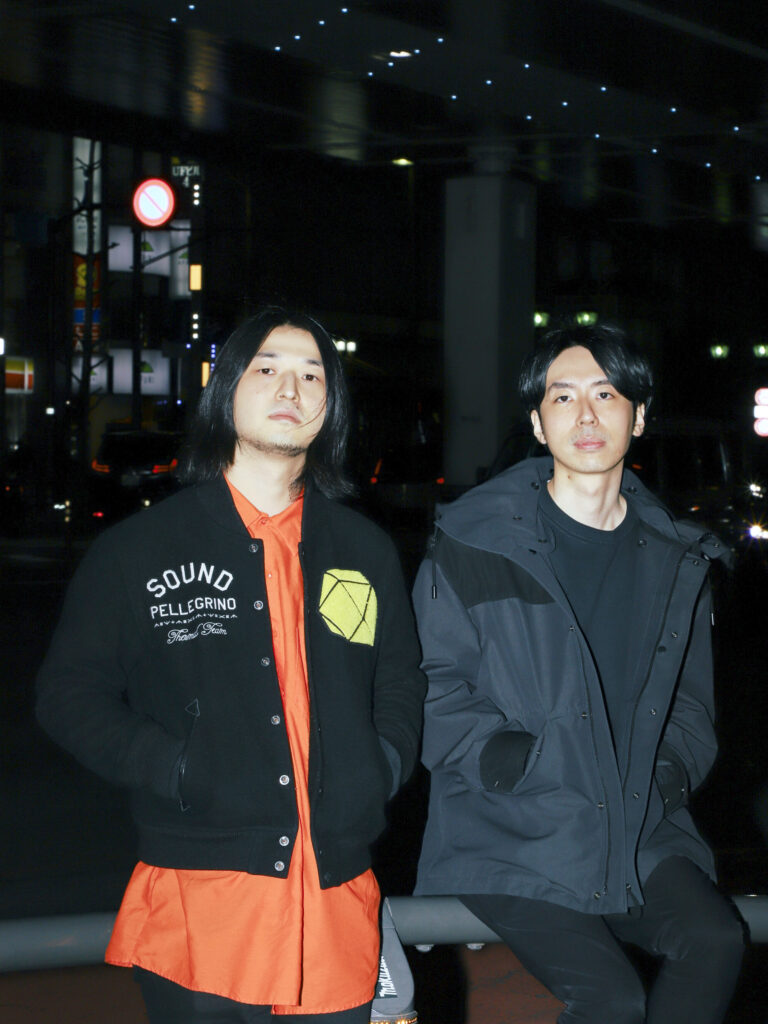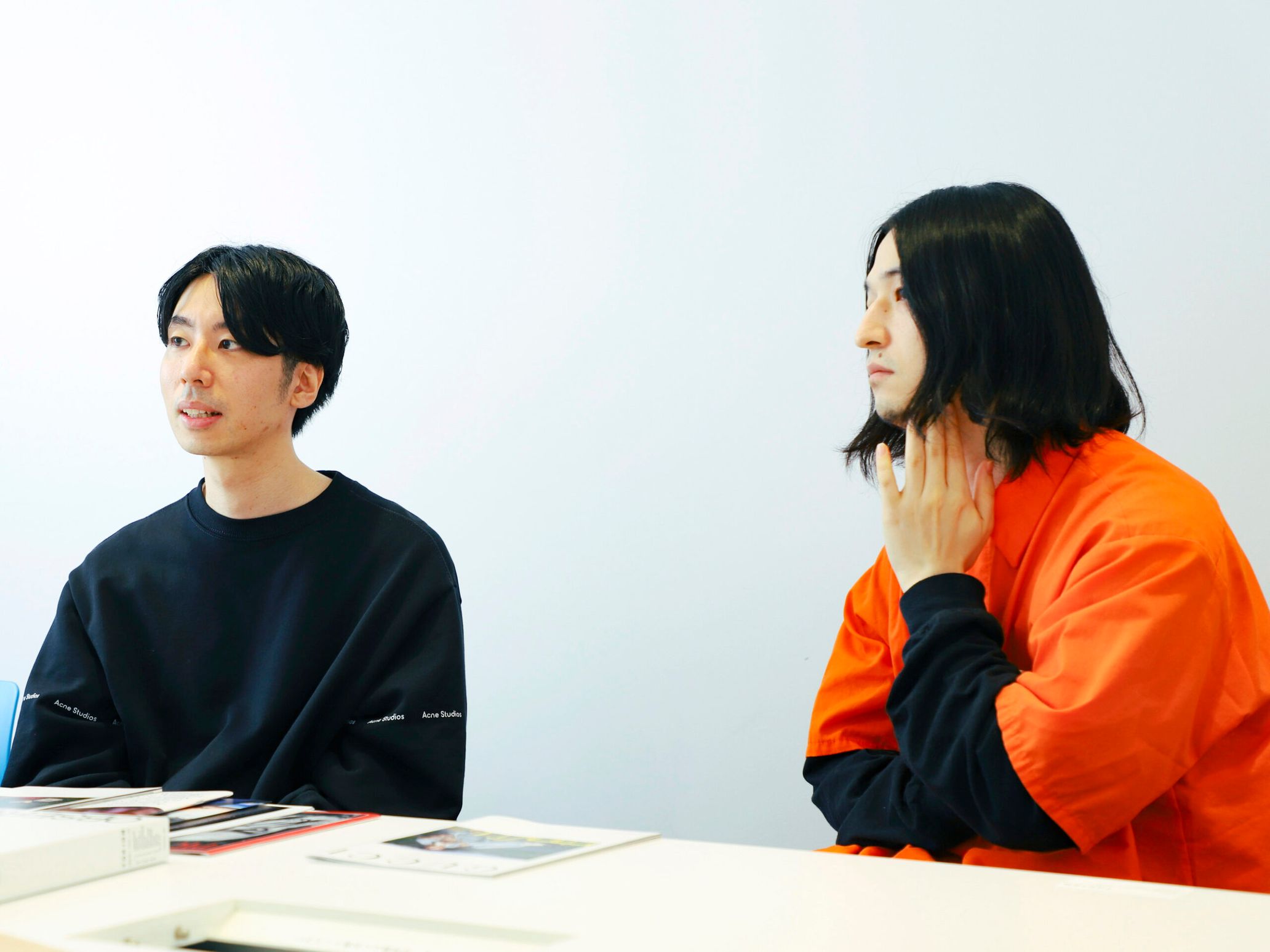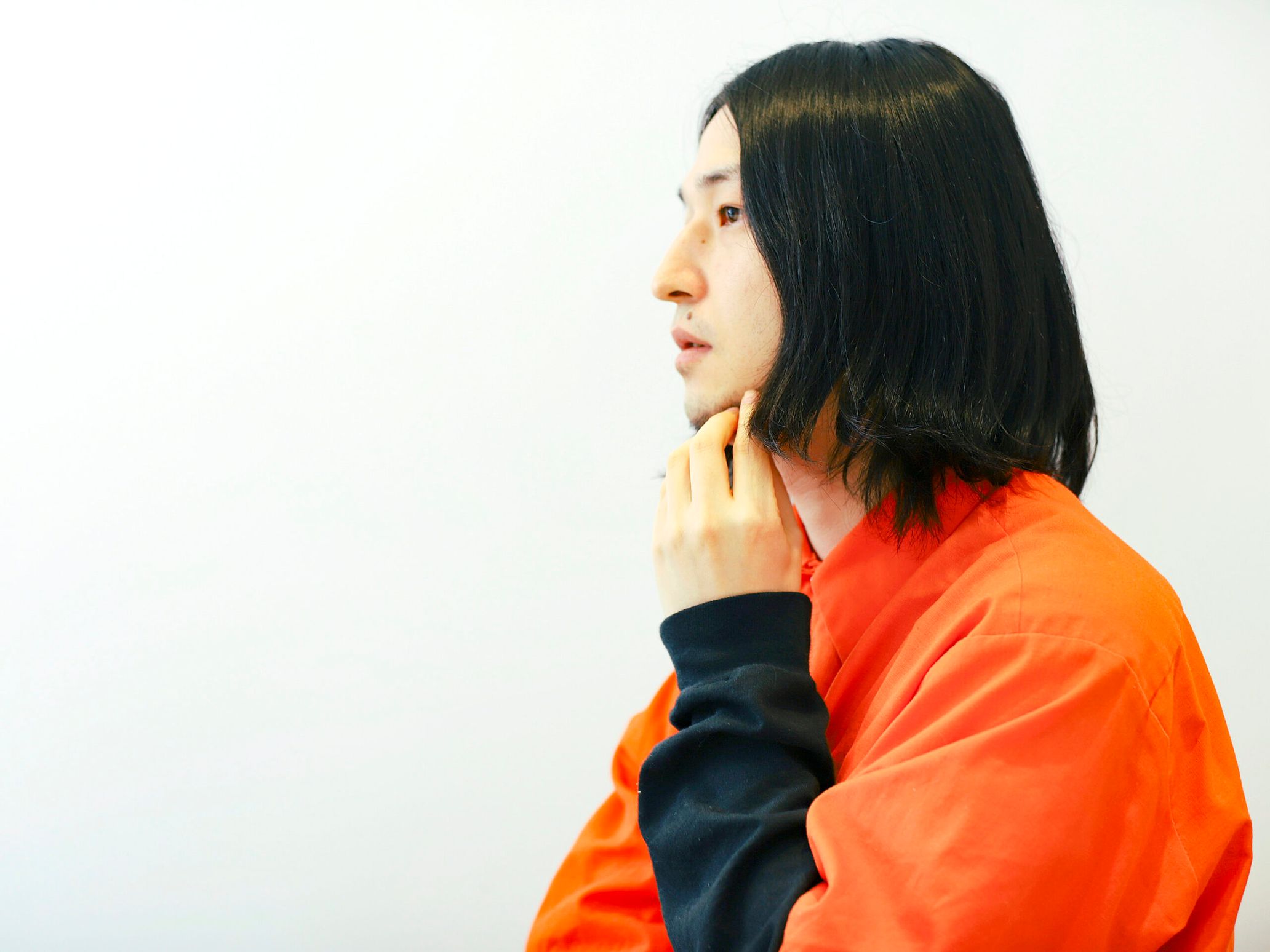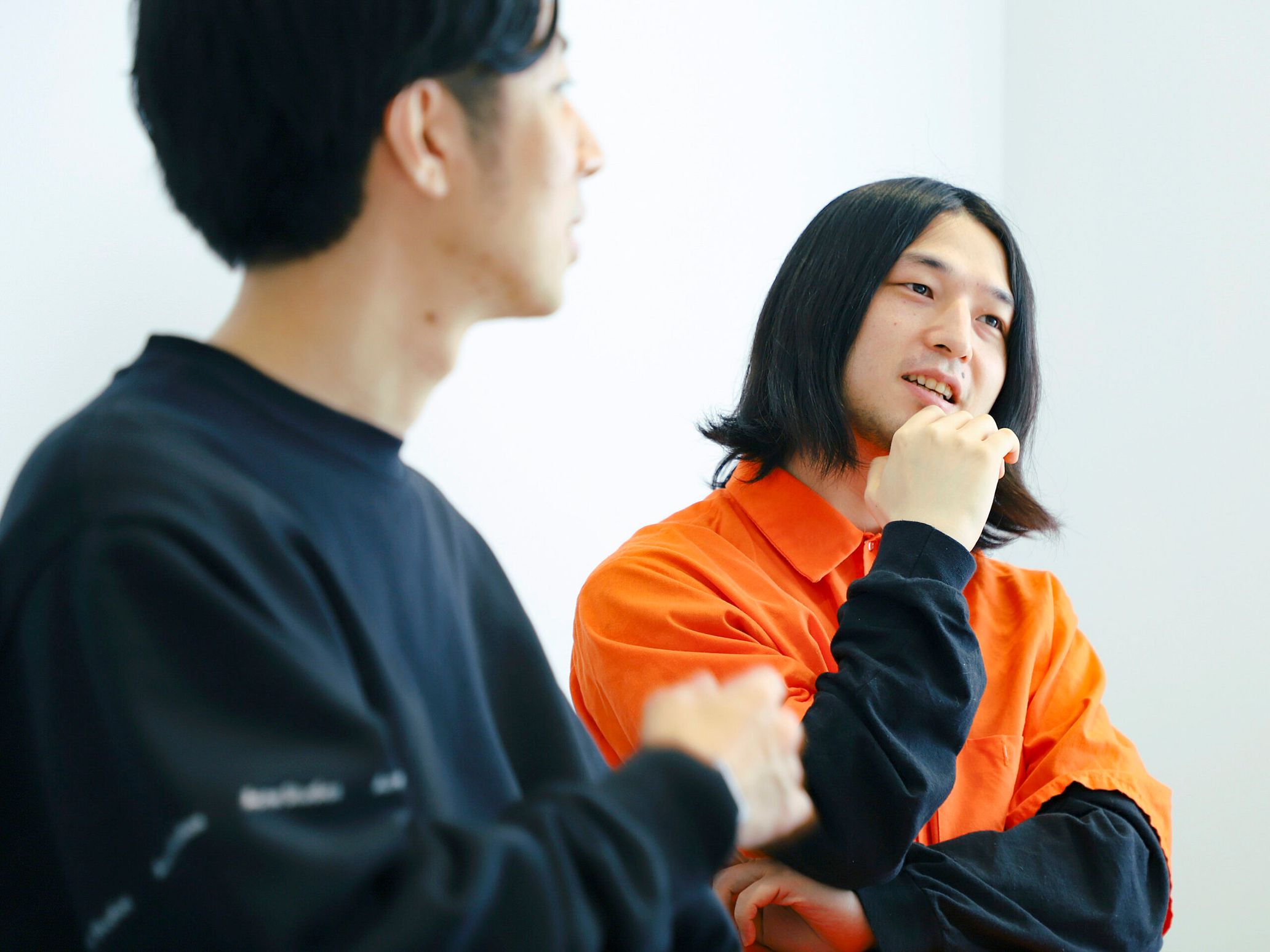TAAR, a DJ and a music producer based in Tokyo, and MASAtO, from the music producer duo ANIMAL HACK, asked people to participate in making a song with the Clubhouse app, and produced “Clubhouse (feat. CHICHO CARITO and Mitsuki Aoyama).” Participants came from different genres and areas of music, and included Mitsuki Aoyama, Seiho, Daisuke Kazaoka, CHICO CARLITO, Daisuke Hasegawa, Nanako Hoshino, madflash, Anna Yano, and YOSY POKARI. A project to create a remix of the original song was launched later.
We asked TAAR and MASAtO, the core members of the project, about the creative process, which included co-writing a song —a practice that is not so common in Japan. How the open process can improve listening skills in music, and the impact of subscription-based music streaming services on listeners’ relations to music.
–How did you end up creating a song with the Clubhouse app?
MASAtO: I have been discussing with TAAR about making a song together, and we reached a point where we wanted to find a singer. Then, we thought maybe we could find a singer using the Clubhouse app.
TAAR: Clubhouse is an app that the general public can join and I thought that I could organize something similar to an audition. I didn’t want to say that it was an audition per se, as I thought it would sound too high-handed. I talked to MASAtO, and we decided that we would first gather people in a room and propose making a song together.
MASAtO: We created a room on the app, and named it “Who wants to make a song together? (Singers welcome).” We weren’t planning to make a song right away. We never imagined that we could use social media that we were not so familiar with, and make a song. However, we could actually make a song in about 4 hours.
–While you were making the song, I think there were many listeners.
MASAtO:When we were making the song, I think there was a steady flow of about 80 to 90 listeners. Once we opened a separate room in the end to listen to the song, there were around 200 people. The difficulty of making a song with Clubhouse is that when the musicians are concentrating, they become quiet. In order to make the process entertaining, we had to assign someone to keep talking. It was important to divide the tasks.
TAAR:In that sense, I think it worked out well that we, as producers, initiated the project. We played our role as producers, and never stopped working on the song while ensuring that someone was talking.
MASAtO:We needed to make sure that there is no pause in the conversation, and that prompted us to reduce the time to do anything elaborate or become indecisive. We felt pressure to pass on whatever we created as fast as we could to other musicians.
TAAR:When you co-write a song with other people, the process itself has a unique atmosphere. It’s similar to working with studio musicians as we try not to be idle, even for a moment. I think that is why we could make a song in such a short period of time.
–To raise your hand to write a song together, I thought you needed confidence.
TAAR:When you are making a song, confidence affects the quality of the song, and we ended up with high-quality output. The participants had high musical literacy.
MASAtO:While we tried to be as inventive as possible with the short loops, which are the shortest units in the song, we asked TAAR to make the final decisions for the overall song, and I think that was critical. We chose a process that does not lead to discussions, and that is why we could finish a song in a matter of 4 hours. If someone had started to ask “Please put my sound first,” we would not have been able to finish anything.
–Since you had artists from different genres of music, did you learn how others composed music?
TAAR:When I received the recording of the first 4-hour session in the Clubhouse room from MASAtO, I discovered how the synthesizers were overlaid. We never made music together before, so it was interesting to learn his habits and approach.
MASAtO:Later, we created a Clubhouse room for mixing. When I heard the mixing by TAAR, it was done in a way that I never imagined, and I was also impressed with his skills. Music producers usually work on their own, looking at their computer screen. So, they tend not to know what others are good at. In that sense, it was an ear? (sic)-opening experience.
TAAR:When we use the Clubhouse app, we usually make an excuse saying, “Perhaps, the listeners are interested in learning about this,” and spread some information that people would normally pay to access.
–When you shared the process of making the song, weren’t you concerned about plagiarism?
TAAR:No, we were not worried at all. The whole process felt like a jam session. First, I laid out the basic chord progression, and presented a format where the participants could feature send up their ideas.
MASAtO:We didn’t make any of the parts used in the song. The parts were pretty common and have been used a lot. We combined those parts, and turned them into something original. That’s why it’s not worth plagiarizing any of the parts.
Thanks to Listeners’ Discerning Ears, We Can Share the Songwriting Process
–I thought it was innovative to share the process of making a song with the listeners.
TAAR:As for me, it’s so much more interesting to see how music is created, rather than listening to it. That’s why I wanted to share how much fun the process is. And, I thought that it was a new way of experiencing music. For example, “KanJam Kanzen Nen-Show,” the program on TV Asahi, has a popular segment that is dedicated to explaining the technical aspects of songs. That’s why I thought people would enjoy learning about the process of songwriting. It’s as if you are working in an open kitchen, and people can observe the entire process of cooking something.
MASAtO:We actually played the song about five times, when hosting the Clubhouse session for 4 hours. The rest of the time, we were going back and forth about making the song. In spite of that, most people listened until the end, and enjoyed the process. TAAR is a highly artistic club musician, and I thought that he was not going to share anything that was not complete. I was under the impression that he selected the songs that he featured very carefully, and would say that he only works with musicians of his choice. I didn’t think that he would go for the “open kitchen” style of songwriting. For me, I found it interesting that someone like him decided to be part of such open process.
TAAR:I don’t think we could have done the same thing, five or ten years ago. Since subscription-based music streaming services started, there is a divide between the listeners of the latest music, and the famous older songs. Listeners have become connoisseurs listening to the famous older songs, and the contemporary musicians do their best to make songs that are better than those. This has created a synergy, to improve the quality of music as well as the listeners’ skills, in the last three years. We see more people listening to music without putting music on a pedestal, as it is something to be admired. That makes things easier for us.
MASAtO:We see quite a few media coverage that focuses on the psychological part of the musicians when they make songs. However, a program such as “KanJam Kanzen Nen-Show”, which provides explanation for songs, is popular. It helps people to become better listeners, with discerning ears. Then, the musicians realize that they need to make good music, and it creates a productive cycle.
TAAR:When you learn about the process of making music and listen to the final outcome, I think it actually improves your listening skills.
MASAtO:We can now listen to several thousand new songs every week via streaming, and our appreciation for each song diminishes comparatively. However, our project allowed the listeners to experience the songwriting process, and create a deeper connection to the song. I am sure it was an enriching experience.
TAAR:In the process of making the song, I started to feel the desire to create a situation where listeners can have a deeper connection to the song. This is something that I didn’t feel in the beginning.
Clubhouse is Similar to a Park, a Public Space Where Everything is Fluid
–I saw that the you made the stem data of “Clubhouse (feat. CHICHO CARITO and Mitsuki Aoyama)” public, and launched the #ReroomProject to remix the song. I heard that ☆Taku Takahashi participated in the remix project.
MASAtO:We asked Taku to set up a room in Clubhouse, and create a project to finish a remix in 4 hours. In this room, anyone could raise their hands and say, “I want to play a guitar” or “I want to play a flute.” Once the participants send the data to the owner of the room, the owner gets to decide where to add the data in the song.
–Do you plan to use Clubhouse as a tool to make music?
MASAtO:I would like to use it, but we are discussing if we can create an open space to make music that is not just on the Clubhouse app.
TAAR: This time, we wanted to create a place like a park where we could share music with the general public. Compared to Zoom and Discord, participants can come and go in Clubhouse; it’s an app with fluidity and openness. There is very little time lag on the app and the conversation is clear even when different people are talking at the same time. It’s an excellent communication tool. I think I can find ways to combine it with other tools, and incorporate it in my work.
–As a fan, I am hoping that(YOSA &)TAAR×ANIMAL HACK will make more songs together.
MASAtO:I would like to do that. I think ANIMAL HACK is good at creating distinctive sounds, while YOSA & TAAR is good at creating ambience and details. I have a feeling that mixing those elements will result in a powerful work. I also have this wild dream of us co-writing a K-POP song.
TAAR:I would love to do that.
–Lastly, are you planning to release any work soon?
MASAtO:I don’t have any definite plans yet, but we are working on songs featuring a singer, and collaborating with a music producer on a separate project. We want to make our own songs but we are struggling, as it’s so hard to write lyrics about your own life.
TAAR:I am now producing two albums: one by YOSA & TAAR; the other by TAAR. I am also releasing some work that I produced. Please check my social media for updates.

TAAR
TARR is a DJ and music producer based in Tokyo. In 2012, he produced an album abstrk (limited edition and self-released), which sold out immediately. In 2014, he released eyes of you featuring ShigeoJD, followed by three digital EPs. He was selected as the resident DJ of MODERN DISCO, which launched in February 2015. He released Astronotes in Disco, an album about zero gravity drifting, in February 2017. In the Summer of 2018, he started YOSA & TAAR, a collaborative project with YOSA, and released their first album Modern Disco Tours, in March 2019.
Twitter: @TAAR88
ANIMAL HACK
ANIMAL HACK is a music producer duo based in Tokyo. They made their debut in 2016. The following year, their song “Franny” was selected as the theme song when Apple Store Shibuya branch reopened after a renovation. “Pressure,” which was released the same year, was chosen as one of the “100 best songs in the world representing 2018” by Apple Music Japan. In addition to their original songs, they worked with artists such as SIRUP and 4s4ki. They produced a song for Hypnosis Mic, a multimedia project, and created an official remix of “Kingyo Hanabi,” by Ai Otsuka. They also work on visual art and art projects as producers.
Twitter: @a_nima_l_hack
MASAtO Twitter: @masatoanml
As part of the Clubhouse project, remixes by AmPm and Frasco & SKYTOPIA were released, respectively on March 3 and March 17. A remix by ☆Taku Takahashi is scheduled to be released on April 7, and an EP with a total of eight songs including three remixes by YOSA & TAAR & ANIMAL HACK, TiMT, and Batsu, will be released in the same month.
Photography Yuji Sato
Translation Fumiko Miyamoto




